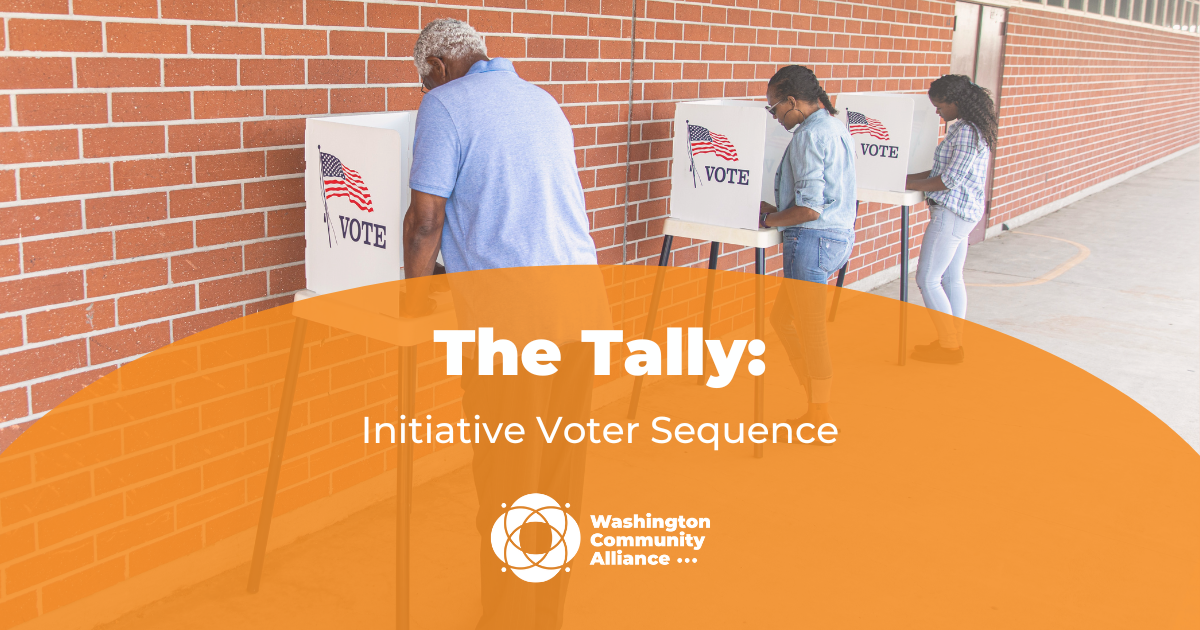
Hi bunnies,
Last you heard from us, we did our best School House Rock impression of how an initiative goes through the legislature to the ballot. If that is the ghost of initiatives past, this week, we dive into the ghosts of initiatives, present and future—namely, we look at right-wing-hedge-fund-manager-backed Let’s Go [Backward] Washington.
The top line: the Trump-y far right proposed three ballot initiatives to the legislature that would undermine the freedom of communities of color like ours by keeping power and money in the hands of corporations and billionaires. The legislature said yes to three of them. So we’re off to the races.
🗳️ Ballot Initiatives 201 🗳️
The Let’s Go [Backward] Washington initiatives
We’ve been talking about these initiatives all session because they are a tactical, strategic move by Republicans to undermine progressive policy and turn out their voter base this November. They put six ballot initiatives to the legislature, three of which were all passed as written.
I-2081 – Establishing a Parental Surveillance State
I-2111 – Keeping Our Tax Code Upside Down
I-2113 – Legalizing Dangerous Police Pursuits and Making It Easier to Kill Black and Brown People
3 Reasons Democratic leadership says passing these terrible right-wing initiatives is “strategic”
- Republican incompetence: As Democratic leadership tells it, the initiatives were so badly written that they don’t believe the anti-trans “parental bill of rights” will be held up by the Courts, the ban on the state income tax doesn’t change current law, and the rollback of restrictions on police don’t apply to 80% of Wahsingtonians because the largest cities and counties (like King and Spokane) already have stricter local restrictions on high-speed pursuits.
- Timeline: When an initiative is passed by the legislature, the legislature can amend it after 90 days of implementation. But when it’s passed by the people, the legislature cannot make any changes for 2 years following implementation. We’re told that Democratic leadership met with a number of groups led by and affected by those three initiatives (LGBTQ+ orgs, families harmed by police violence, and progressive tax wonks). They all agree that it would be less harmful to pass them now and amend them in 2025, than to risk locking in terrible policy for 2 years at minimum.
- Polling: That last point was directly informed by what seems to have been dismal polling. All of these initiatives were polling well above 60% and some as high as 80% – margins that even the best campaigns and organizers would find nearly impossible to turn around in a matter of months.
Why we’re skeptical
The biggest reason for skepticism is that leadership’s strategy amounts to a pinky-promise. They cross-their-heart-and-hope-to-die that the new legislative leadership—not knowing who they are and after being newly elected—will be willing to shake things up and amend the initiatives their predecessors just passed.
Tenuous pledge aside, Democratic leadership has a history of breaking promises exactly like this one. It wasn’t too long ago that Tim Eyman’s 1% Property tax was found to be unconstitutional, and yet the legislature did nothing. In fact, former Governor-turned-Corporate-Advocate Christine Gregiore actually joined Eyman’s 1% property tax cap campaign to strangle local government services.
Years later, this past session, when Very Serious People like King County Executive Dow Constantine and State Senator Jaime Pedersen pleaded with their Democratic colleagues to change Tim Eyman’s law because it threatens to bankrupt counties and cities, the legislature still didn’t budge. If the Very Powerful Floor Leader/Ways & Means member/Rule committee member Jaime Pedersen can’t get his own colleagues in Democratic leadership to make good on their promise to fix right-wing initiatives passed into law—who is to say this time will be different?
Republicans may have been too incompetent to write legally sound initiatives, but they weren’t too incompetent to get them on the ballot. It makes us wonder why leadership and the well-healed faction of the progressive ecosystem stood idly by while Heywood’s army of paid canvassers from California gathered signatures before responding.
So what initiatives are on this year’s ballot?
Three initiatives were not addressed by the legislature and are heading to the ballot this fall:
I-2109 which repeals the Capital gains tax on the wealthiest 0.2% of Washington residents, taking away $800 million from early learning and education
I-2117 which ends Washington’s program to make polluters pay what they owe and funds climate resiliency initiatives like electrifying school buses, and a near universal free transit program for youth
I-2124 which would repeal long term care coverage for working Washingtonians
What we left on the table
Many in the chattering class have known for the last year that these right-wing ballot initiatives were on their way. The last-minute maneuvering by the legislative leadership is, at best, poor planning and sloppy politics—creating a cascading effect of political advocacy organizations and coalitions spending tons of resources on defense.
We shouldn’t have to play defense.
Like we mentioned last time, the history of our state’s ballot initiatives comes from a previous era’s populism—which can be used for good! That’s how we became the first state in the nation to pass universal background checks for firearm sales, established a $15 minimum wage, legalized weed and gay marriage.
Every presidential election cycle—when more people turn out to vote than ever before—is an opportunity to harness popular sentiment. Initiatives are a direct channel to engage with voters that create genuine opportunities for base building. They get communities excited because they offer very popular, tangible solutions to specific issues (i.e. rent control, taxing billionaires, universal childcare, and tuition-free college).
Progress we saw during the pandemic has been drawn backwards again. We are regressing back to the mean. We said at the end of session that we have seen a return to pre-pandemic legislating and that’s not good news.
We’re at a decision point, either we go backwards to pre-2020 and the conditions that were not great for our communities, or we use this moment and the pandemic as proof that 1) we can pass meaningful policy that impacts peoples lives, and 2) the politics of doing good is good considering Democrats keep amassing power and building bigger majorities.
We shouldn’t be playing checkers when we learned how to play chess. We should be smarter than this.
What do you think? Have any questions? Tweet us your thoughts @WACommAlliance.
Keep up on the action and opportunities to get involved through our legislative newsletter, The Tally.

